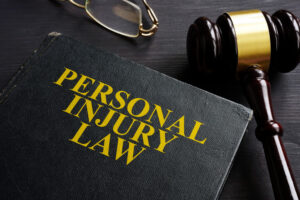Why You Need a Personal Injury Lawyer
When you suffer injuries from an accident or other occurrence, your lawyer will act as a buffer between you and those who want to interfere with your recovery. These people include debt collectors, insurance companies, and employers.
Ogden Utah Personal Injury Lawyer will establish that a defendant owed you a legal duty. These include driver’s duty to operate their vehicle safely or a doctor’s duty to treat patients according to the medical standard of care.
When you’re involved in an accident that results in injuries and losses, it is essential that you find the right legal professional to work for you. This isn’t something that should be left to a general practitioner, who may or may not have handled injury cases before. A good personal injury lawyer will provide you with objective opinions about your case that aren’t clouded by the fear, anger, frustration, and stress that most injury victims understandably experience.
In addition, a personal injury attorney will have the resources necessary to conduct the appropriate investigation of your case. The law firm may have its own investigators who document the scene of an accident, interview witnesses, and develop theories about how the accident occurred. They may also have relationships with outside experts, such as accident reconstruction professionals.
The right lawyer will also have the ability to negotiate with insurance companies on your behalf. Insurance companies have the primary goal of paying out as little as possible so they can maximize their profits. A good personal injury lawyer will be able to counter their low-ball offers with persuasive arguments that help you get the compensation you deserve.
You should also ask an attorney how many cases they handle at a time and what their track record is. A lawyer who is overbooked is unlikely to be able to devote the necessary amount of time and attention to your case, which could delay your lawsuit and jeopardize your chances of winning your claim.
Additionally, you should ask an attorney what their policy is on expense reimbursement if they lose your case. Some lawyers will reimburse their clients for their out-of-pocket expenses in a lost case, while others will expect the client to pay for all expenses regardless of the outcome of the case. Ideally, you should select an attorney who has a no-reimbursement policy and will only charge for their services if they win your case. This way, you can rest assured that your lawyer will be devoted to the successful outcome of your case. They will not take your case lightly, and they will always work hard to ensure that you receive the compensation that you deserve.
They can help you understand your rights.
The legal system can be complex, and it’s important to understand your rights as a victim of an accident. An experienced personal injury lawyer can help you navigate the process and explain your options. They can also help you understand your obligations, including your right to recover damages and your obligation to cooperate with the insurance company.
A personal injury lawyer can be your confidant and trusted ally during this difficult time. They can answer questions and quell concerns while you focus on healing. They can also handle complicated legal processes like filing a personal injury claim, documenting injuries, and proving negligence.
After you’ve hired a personal injury attorney, they will start an investigation into your case. This includes reviewing medical records, interviewing witnesses, and examining any physical evidence. They will then compile this information and send a demand letter to the responsible party. This will outline your injuries and the amount of compensation you are requesting.
Once the demand is received, the insurance company will start to negotiate. If the insurance company is unwilling to offer you a fair settlement, your personal injury lawyer can take them to court. They will argue for maximum compensation and help you recover a larger award.
Personal injury lawyers can save you a lot of time and money during the claims process. They can prevent you from making mistakes that could delay your case or cause it to be dismissed. They can also ensure that all legal procedures are followed correctly, which can save you from having to file an appeal and wasting more time on the case.
The hiring of a personal injury lawyer can show an insurance company that you are serious about your claim. They will know that you’re not going to settle for a lowball offer, and they may increase their initial settlement offer. In the event that the insurance company is still not willing to agree to a fair settlement, your personal injury attorney can take them to court and strive for a better outcome from a judge or jury.
When choosing a personal injury attorney, ask friends and family members for recommendations. They will be able to give you an honest and trustworthy opinion about their experience with the attorney. You can also read reviews online or check out the attorney’s disciplinary record to make sure they are qualified and ethical.
They can help you deal with insurance companies.
You may be dealing with mounting medical bills and a loss of earnings from an injury. This can be overwhelming, on top of dealing with the pain and discomfort from your injuries. Getting compensation from the party responsible for your accident can help offset these expenses. A personal injury lawyer will work to get you a fair settlement for your claim.
Insurance companies can be difficult to deal with, especially when you’re injured and trying to recover. A seasoned personal injury attorney will handle all negotiations with the insurance company for you. This can help level the playing field and prove your damages in a more persuasive manner than you could on your own. In addition, studies have shown that claimants who hire attorneys receive higher awards for their cases.
A personal injury attorney will also ensure that your legal rights are protected throughout the claim process. This includes filing all required legal documents and avoiding mistakes that can lead to costly delays or even denials of your claim. Your attorney will also avoid making any statements to the insurance company that could be used against you, such as admitting fault or reducing the value of your claim.
Your lawyer will work with outside experts, including accident reconstruction specialists, to gather evidence proving causation, fault, and liability. They’ll also consult with your physicians to document your injuries and calculate the total value of your damages. Using this information, they can develop a demand letter to present to the insurance company.
If the insurance company is unwilling to settle for a reasonable amount, your attorney will advise you to take your case to trial. A jury will be able to determine how much your case is worth, and the insurance company is likely to make a more generous offer in order to avoid going to court. In addition, the insurance company will know that your attorney is prepared to take your case all the way to a verdict in front of a judge and jury. This can often increase your award for both non-economic and economic damages.
They can help you prepare for the trial.
Nobody plans for an accident, but if you are injured in one, you need someone to protect your rights. An injury lawyer can help you get the money you need to pay for medical bills, lost wages, diminished future earning potential, and other costs associated with your injuries. He can also fight for your right to pain and suffering compensation. He can also help you get the best doctors who can treat your injuries and will be great witnesses if your case goes to trial.
Your attorney can provide you with the support and structure that you need while focusing on your recovery. He can control the flow of information to the insurance company and make sure that the insurer keeps its promise to pay your claim in a timely manner. He can also ensure that the company does not lowball you with offers for less than your true damages.
The right personal injury lawyer can also represent you in court if your case cannot be settled through negotiations with the insurance company. This is an important role, and it must be done by an attorney who is familiar with the local courts, rules, and procedures.
You should look for a lawyer who regularly attends seminars to update their knowledge of the latest changes in the law and how they can affect your case. You should also find out if the attorney has lectured to other attorneys or written articles in legal publications.
It is important to bring all relevant documentation to your first consultation, including copies of police reports, witness statements, and any other documents related to your case. During your meeting, listen to how the attorney answers questions and how well he communicates. He should treat you with respect and dignity. He should be polite and courteous to you as well as to the other people involved in your case, such as the police and the insurance company.
You should consider how many years of experience the attorney has and whether he or she has tried personal injury cases to a jury verdict. A lawyer with more experience can often make a difference in the outcome of your case.
Drain Cleaning: How to Get Rid of Clogged Drains Without Calling a Plumber
Drain Cleaning Tampa is important to prevent clogs, blockages, and leaks. Regularly cleaning your drain pipes can also extend the life of your existing pipes.
Eco-friendly drain cleaners are made with natural or green ingredients and are available in gel form. They are a little slower to work than caustic chemical drain cleaners.
Clogged drains are not just messy, but they can also be dangerous. They can create an ideal breeding ground for bacteria and other harmful microorganisms and can result in sewage back up and flooding your home. However, with a little knowledge of what causes clogged drains and some simple preventive measures, you can keep your home’s drains clear and running smoothly.
Hair, soap scum, mineral deposits, and other debris can clog sinks, showers, and tubs. Using a plunger or commercial drain cleaner often works to remove these items, but if the clog is caused by an object that is too large to be removed with a plunger, you may need to disassemble the drain trap or use a sewer snake.
Most drain clogs form over time as grease, hair, and other waste stick to pipe walls. The best way to prevent these clogs from occurring is to be vigilant about what goes down the drain and to dispose of waste properly. If you notice that a drain is slowing down or not functioning at all, it’s important to address the issue immediately, as it will only get worse.
Kitchen drains often clog due to food scraps, cooking oil, and other fatty substances that are rinsed down the drain. If these materials solidify, they can clog the entire pipe. You can prevent these clogs by not rinsing fats down the drain and by disposing of fatty foods in the garbage.
Bathtub, sink, and toilet drains can also become clogged due to the buildup of soap scum and other debris. To help avoid this, you can regularly clean your drains by pouring boiling water down them. This can help dissolve soap scum and other debris and will also clear hair clogs.
Another way to clear a mildly clogged drain is by mixing baking soda and vinegar. This is a natural and safe method for cleaning your drains, and it can be used in place of chemical drain cleaners, which are toxic and can damage your pipes. To try this, simply heat up a kettle of boiling water and slowly pour it down the drain, allowing a few seconds between each cup.
Clogged Toilets
Clogged toilets can be extremely unpleasant to deal with, especially if the clog prevents you from flushing. However, most clogs in a toilet can be cleared without the use of a plumber or expensive plumbing tools. First, try using a plunger to dislodge the clog. If this doesn’t work, try filling a bucket with hot bath water (not boiling, as this can crack porcelain) and pouring it into the toilet from waist level. This will sometimes dislodge or loosen the clog enough to allow it to pass through the trap and flush away. If this doesn’t work, you can also try prodding the clog with a wire coat hanger. Be very careful when doing this; you don’t want to accidentally break off a piece of the porcelain toilet bowl!
Another possible cause of a clogged toilet is a blocked toilet vent. These vents are built into toilets to help them build up pressure for strong, clog-preventing flushes. If the vent becomes clogged, the resulting backpressure can force waste into other toilets in your home and even cause them to overflow. It’s important to clean up any debris regularly to prevent this from happening.
A final potential problem is a clogged sewer line. Every drain in your house eventually leads to this line, which carries waste out of your home and into the municipal sewage system or your septic tank. Debris can accumulate in the lines from inside or outside your home when tree roots get into them. If you have multiple clogged toilets, it may be a sign of an issue with your sewer line.
If you have tried all of the above solutions and your clog persists, it is probably time to call a plumber. You may also want to consider a non-toxic sewer line cleaner, such as enzymes. These cleaners are designed to break down and liquefy matter that clogs drains, such as food particles, grease, human waste, and hair. However, they can take a long time to work and won’t be effective on very stubborn clogs.
Clogged Sinks
If your shower drain or garbage disposal is completely blocked, it’s probably time to call a plumber. However, many clogs are simple and easy to fix without a professional. Here are a few ways you can clean your own drains and keep them from becoming more serious problems.
First, try a plunger. Fill the sink with a few inches of water, then plunge up and down vigorously. Repeat as needed until the clog dissolves and the water flows freely down the drain.
Next, try a mixture of baking soda and vinegar. Pour one cup of baking soda into the sink drain, followed by a cup of white vinegar. Wait for the mixture to work its magic, then flush the drain with more hot water. This combination can break up light clogs and deodorize your home’s drains at the same time.
If the plunger and baking soda combo doesn’t do the trick, you may need to remove your sink trap (the U-shaped section of pipe under your sink). Grab a bucket to catch any overflow, then loosen the fasteners holding the trap in place with a wrench or your fingers. Pull out the trap and inspect it for blockages. Use a bent wire coat hanger to fish out any hair or gunk stuck in the drain. Once the trap is clear, clean it and put it back in place.
Another option is a plastic drain snake, which can be used to unclog hard-to-reach spots in your plumbing. These snakes are flexible and can easily slip down the length of a vertical pipe to cut through clogs or grease buildup. Just be sure to clean your snake after each use and avoid using it on metal pipes.
To prevent a future clog, make sure you regularly clean your drains and use a strainer basket in your kitchen sink to catch food particles. You can also try running boiling water mixed with grease-fighting dish soap down your drains once a week to prevent greasy buildup. And don’t throw any food scraps in the trash can; they could become a breeding ground for dangerous bacteria and cause an overflow.
Clogged Sewers
If you notice that one or more of your drains are slowing down or that your toilet seems to be filling up with water whenever someone uses it, chances are there is a main sewer line clog. Clogs in the main sewer line are more serious than clogs in individual drains since they affect all of the drains in your home that connect to it.
The first thing to do when you suspect a clog in your main sewer line is to turn off the water in your house. This keeps accidental runs of the toilet or running water from contributing to the clog and prevents any water from backing up into your home.
Next, remove the screw-on cap on your home’s cleanout pipe, which is located near where the pipes exit your basement. This will allow you to access the clogged pipe. You can also use a drain snake to break up and dislodge large clumps of debris.
Using hydrogen peroxide can also help dissolve stubborn clogs, though you should always wear gloves and eye protection when handling harsh chemicals. Pour 1 cup of the solution down a blocked drain and wait about 15 minutes. Then, run hot water down the drains to see if the clog has cleared.
If the clog was caused by a buildup of grease, you can try to dissolve it by mixing hot water with some grease-fighting dish soap. You can also pour down a solution of enzyme drain cleaner, which can digest grease and other non-biodegradable materials.
If tree roots are the cause of your clog, you can try to kill them with chemical drain cleaners that are safe for septic systems. Caustic drain cleaners like potash or lye can work well for this purpose, as can caustic soda. If you’re worried about the safety of these cleaners, consider a natural alternative like dichlobenil, which is septic tank-friendly. If these methods don’t work, you may need to contact a professional plumber for a sewer line cleaning. A professional will be able to inspect the clogged sewer line with a video camera to determine what is causing it.

